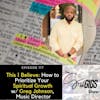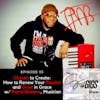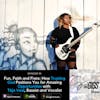Art of Rivals: Does Competition Help Or Harm Your Creative Life?
Is "beef" bad for your creative health?
We're not talking about steak or any other kind of food - this is about 'beef' or animosity between artists.
What happens to creativity when artists engage in rivalry and competition? Does it elevate our artistry or distract from it?
This intriguing discussion dives into famous rap beefs, award show politics, and whether a rival can actually drive you to new levels of excellence as a creator.
We explore the implications of the recent explosion of Drake and Kendrick Lamar's war of words, as well as historical creative feuds like Michelangelo vs DaVinci.
By the end, you'll understand:
- The difference between rivalry and formal artistic competition
- When competition crosses over into harmful territory
- How to focus rivalry on bettering your creative gifts rather than winning
- If you personally need a rival or competitive environment to grow
- How to embrace healthy competition but avoid what diminishes your art
Where should you draw the line? Tune in to gain clarity on what competition does for creativity - both good and bad.
Want to watch the entire livestream discussion?
Tap HERE to see the unabridged livestream
We’ve love to hear your thoughts about this episode… Tap HERE to send us a text!
BUILD YOUR BEST CREATIVE LIFE WITH FREE RESOURCES
Tap HERE to get our Creative Checkup Newsletter
INSPIRED CREATORS COLLECTION
Get updated resources, templates and guides for your Kingdom-minded creative career for just $10 a month here.
godandgigs.com/inspired
PODCAST MERCH
Get God and Gigs themed gear, clothing and accessories HERE!
GOT VALUE FROM THIS PODCAST? Exchange VALUE 4 VALUE!
You can share:
TIME: Send this episode to someone who you know would enjoy it
TALENT: Email your art or music to add to our community to allen@godandgigs.com
TREASURE:
Tap HERE to pick an amount to support the podcast monthly, OR:
Get a modern podcast app that allows you support us IN REAL TIME by sending us value digitally!
Get a new podcast app that supports these new features HERE.
00:00 - The Impact of Competition and Rivalry in the Creative Industry
03:25 - The Impact of Rivalry in the Creative Industry
11:29 - Balanced Competition and Creativity
11:30 - The Difference Between Rivalry and Competition
16:51 - Personal Reflection on Competition
16:52 - The Role of Competition in Creativity
21:09 - Community and Collaboration
[00:00:00 - 00:03:19]
Got rivals, got haters, got people in the music industry, the arts industry that you just don't get along with. Is it possible that you're in this space simply because you are trying to get back at someone or get better than someone? Well, I don't know if that's the way you feel, but it's definitely the way some artists feel, and they have taken competition and rivalry to a whole new level. Now we got to figure out as faith focused, christian, entrepreneurial creatives if that's the way we should behave. Is it helpful or harmful for us to compete with other artists? Is this something we should embrace that makes us better? Or is it something that we should stay away from that makes us bitter? Well, we jumped into this in a amazing discussion that I want you to hear and make up your own mind. So give me just a moment to welcome those of you who are new to our guiding gig show, and then we'll get right into this fascinating and challenging conversation. Hello and welcome to our show. Thank you so much for making this podcast a part of your creative day. And if you are new to our show, let me tell you why you're in the right place at the right time. First, a quick introduction. My name is Alan C. Paul. I'm a musician. I'm an author, I'm a speaker and a creative coach. And I'm here to help you to build your best creative life from the inside out by applying timeless spiritual principles to the temporary creative problems that you're facing. That's what we do here at guiding gigs. We've been doing that through my book that was released back in 2016. The podcast has been around since 2017, so you can see we've been in it for the long haul. And I hope that you'll join us by subscribing, by connecting with our community. And I'll give you a lot more information on that at the end of this creative checkup episode. Speaking of creative checkups and checking up on whether we're looking at competition the right way. As I mentioned in the open, this beef between rappers, between artists, people who don't get along or don't seem to get along in the public eye, has been all of the talk in social media recently as I'm recording. But that's something, as you'll see, that's been around for a long time with artists. The thing we need to figure out is, is it helpful or is it harmful to our creative careers to enter into these competitive, rivalry type places in the creative life in the industry? Does it help us or does it actually take away from what we're able to create? Well, we dove into that in a creative checkup episode and a live stream that we did, and I think this is going to be perfect for you as well. We've taken out a lot of the visuals and some of the interaction where you can't really tell what's going on in the live stream. You can always go back and look at the live stream if you want, via our link in our show notes on our YouTube page. But if you want to hear the gist of what we talked about, it's in this creative checkup excerpt. So let's dive right into it. Let's check out whether or not competition, rivalry, and any of these other types of things can actually be harmful. Your career, or if there's a way that you can channel this kind of energy the right way so that you come out as a better artist in the end.
[00:03:25 - 00:11:29]
I want, first of all, be honest, I don't know much about Kendrick Lamar or Drake. I actually listened to a 20 minutes summary from my daughter Naomi. Thank you so much for catching your old man up on the beef between Kendrick and Drake. I know about Kendrick, obviously, as a rapper. I know about Drake as a rapper. I know them both as artists, but I don't know much about the history behind these two. But as we if you've been on social media at all, if you don't even follow hip hop, you have seen how this has exploded all over social media, how it has created such an incredible amount of, uh, for and against. Both of these artists have had top, you know, top the charts with these diss tracks. And what we're not going to do today is we are not going to talk about who's winning the beef between Drake and Kendrick. Matter of fact, we are really going to focus on your creative life. We're going to focus on, do you have, or do you need a rival? Do you need competition? One of the things that I really have struggled with throughout my creative life and just my overall, just the way I approach creativity is I've always had an issue with award shows. And my issue has always been not that we shouldn't reward excellence, but it always felt kind of arbitrary. It always felt like we were using creativity as like this kind of, you know, pageant where somebody gets this many points or this many points, and we have judges and people, you know, the voice, American Idol, you name it, all these different things. And I've always felt that that kind of competition just limited us to putting people in a box. But then there'll be people that say, well, you know, if you are, have to be in a competition, it makes you be your very best. You have to, you know, really, really push yourself. You have to be honest. And there are times when there's going to be a winner and a loser. And so maybe competition is good for those people in those areas. I guess the first question is, are you a. Are you not for or against competition? Do you think the entire social media, everybody getting excited about a rivalry, an artistic rivalry, is this good for artists in general? Let me just ask you this for you particularly. Do you think that this is good for artistry, this is good for creatives? I mean, clearly it's good for ratings and for their, their fan bases. So is the rivalry good for a creative industry in general? Let's answer that. The question is, do we need each other to sometimes push each other and let's just keep it in a healthy way? Is even competition in a healthy way good for our creativity? Do we need people to kind of one up or try to one up each other? Let's take it to even a bandstand. Let's take it to singing. Let's take it to just where it's a performance. And at that particular, particular time, there's two artists, one on one, one or the other. And there's kind of this back and forth, like, who's doing better? Maybe we get the crowd into it, or maybe there's a couple of artists, I've been doing a lot of reading recently just about this topic, and there was a huge rivalry between van Gogh. I'm sorry, between Michelangelo and da Vinci. Did you know this? Did you guys know that Michelangelo and Leonardo da Vinci did not get along? That they were actually at one point, working on two different things in the same building, and one was kind of disparaging the other. So this is not new. If we can go all the way back to Michelangelo and da Vinci, if we can go back to other famous artists that have fallen out, like Paul McCartney and John Lennon, obviously you can think of the whole rift between, you know, the whole Kanye west, you know, I'm gonna let you finish, and Taylor Swift. There are always going to be conflicts in music and creative art and industry and the arts in general, because we're passionate people. The question is whether this is good for our creativity. So the first thing I want to set up is, again, that I personally have a real struggle with award shows, with competition. That's arbitrary. With competition, where we just need to give a prize to somebody, and we just want there to be a hierarchy of artists. I'm not a fan of hierarchy and artistry, except, I guess, in the case of, well, there's got to be one person that is cream of the crop. We all admire them, and maybe they're at the top of the industry, and we are okay with that. But the pecking, pecking order I am not a big fan of, because I think we all have to give room for each other's individual ality. And what I think the rivalry comes into is whether or not this is about style or substance. Are we rivals with other creatives because we don't like the way they perform? We think that our style is different, or is it just something that's more personal that creates this? If this is a stylistic competition, I think sometimes that could be healthy, because it pushes you to want to make your style or make it clear that you are unique and you want to differentiate yourself. Kind of like Coke and Pepsi. Pepsi doesn't want to be the same as coke. They don't want to be seen as the same. They want to differentiate themselves, and that creates a rivalry between these two brands, which hopefully makes them both better, try to taste better, and so on. So I think there's a healthy kind of competition and rivalry that can be in our creative lives, but there's also an unhealthy one where it gets personal. And maybe some of you are seeing this happen, even in this particular beef with Kendrick and Drake, and you're saying, wow, this can get really, really tearing down people. And as creators, maybe that's tearing us down, and maybe we are lowering our level of people would say vibration. I don't know, our spirit. We're lowering ourselves to something that's not really helping us create better. And that's my question to you. So let's talk a little bit about the way that rat beasts used to be. Let's talk about not even beats, just the competition, the ciphers, the poetry slams, because poetry slams are basically that. They're like competitive poetry, right? And so the rap artists and the hip hop artists that used to, like, you know, battle each other. It was a lyrical battle, and there was, like, a winner and a loser, and there were people that were trying to get on top. And again, I mentioned jazz. I mentioned some other areas where there's obviously kind of like this back and forth, like, who can play better? And I think that's healthy. And so I love the fact that you said, pick a challenge, usual topic, so you can write a dope song, or maybe even, it's kind of like the dozens where we do get a little personal on purpose, but it's, it's actually a creative way to kind of push the envelope and see who can come up with the best ideas. This is why I have an issue with award shows. This is why competition, in certain ways of creative life, I think, stunts creativity, because how many categories can we have? How many categories do we need to really honor the best of the best in a certain area? And does that competition, because we got, like, two different kinds of competition, right? We had the rivalry competition, and we have the official competition. So let's draw a line right there. The rivalry of artist to artist. I'm better than you. You're horrible. I'm gonna tell, I'm gonna, I'm gonna show you up artistically and, you know, demean your character or whatever. That's the rivalry. Then we have the competitive, in the structure of a competition slash contest, where.
[00:11:29 - 00:11:30]
There'S a winner and a loser.
[00:11:30 - 00:16:51]
So I think it's important that first we point out the difference between that competitive rivalry and competitive contest. So I'm obviously leaning more toward, in terms of the way I marketed this toward the rivalry. But I think, again, both of them work hand in hand. I do have, amazingly, some data on this. This is from a study that I found on creativity and competition. And it's, you know, kind of some long words here, but it's important to kind of just really get this in. So I'm just going to read it out for you so you can kind of see where we're going with this and let me make sure I move this out the way. There we go. So creativity and competition balance. This is from a study. I have to find the link so you can see what the attribution is. Balanced competition generally generates creativity. Sorry. Balanced competition generates creativity has implications for managers, creative industries, for procurement. Okay, this is the part I want to get to. Although intrinsic motivation can be valuable, this paper shows that winner take all competition can motivate creativity if properly managed. We speculate that a few, or perhaps even one competitor, similar ability is enough to motivate creativity, whereas many strong competitors may discourage the separate. So let me kind of try to put this in a more common language, what it seems to be saying. The study seems to say that when you have a few competitors in a little, that, that are equally matched, and we're talking about artists, right? So if you have artists that are generally around the same level of ability and they get in the competition, they generally will push each other. That was what the study would say. They would generally push each other to do better work. However, if there are a ton of people who are equally matched, that usually what happens is that people who are creative tend to say, oh, it's too hard. I'm not gonna be able to, like, stand out. I'm gonna back off. What does that sound like? That sounds very much like Spotify, social media, everything where people are like, there's too many people that are good. I'm not going to try. So this is what the effect, according to this paper, is. Okay. This particular idea, is it that more competitors make it harder for us to see ourselves as worthy, and we start to, like, actually diminish. We don't even try. Is that a negative side of creative, of competition? And I would say in the long run, yes, I got to take a stand here. So I don't think competition in the long run, if you've got a bunch of people, and obviously we're talking about competition in the sense of, yes, there are many people. There's only so many eyeballs and so many ears, and there's only so many people that can listen. So overall, the idea of competition does make it harder and harder for us to feel like we belong. So I would agree with this paper. I also agree with this paper that if there's only a few people, that's kind of like a rivalry situation where you've got a Charlie Parker and a John Coltrane who are not exactly the same. You've got this kind of back and forth between, like a Michelangelo and a da Vinci. If you've got this back and forth between artists like a Drake, like a kendrick, it can bring out the best in them. But the question is, at what cost? Competition can bring out the best when we want to elevate our game. But at what cost does that come? Is my question to you. Is it worth it? So let's talk a little bit about whether or not you have a rival. I want to make sure I bring this personally to this group. Do you personally have a rival? Do you personally feed off of competition? Because I can tell you right now, I don't necessarily have any rivals that I can think of, but I have felt, in a sense, that I needed to be competitive in some parts of my creative life. And let me give you an example. When I was a classical pianist growing up, I was a classical pianist in Pensacola as a high school student, and I was in a studio with a bunch of other amazing pianists. And you can tell already in this area that there's not a lot of spots for classical pianists in terms of these certain levels, whether it be to perform and certain, you know, there's only so many spaces in the college that you can get in there, only so many winners of a competition. So it's already going to be like cutthroat. And I realized I wasn't really serious about my classical playing, to be honest with you. I really wasn't taking serious. You know what got me serious? What got me serious was realizing that if I didn't come up to the standard of these other pianists, I was going to look like a fool. I was going to be the first person that didn't win because all of them were valedictorians and all of them won state conscripts or competition. I knew I was going to be a valedictorian, you guys.
[00:16:51 - 00:16:52]
I knew that.
[00:16:52 - 00:21:00]
So it was imperative for me, the competitive part of me was like, I don't want to be the one person that doesn't win this competition because all the other students in the studio for doctor Mister Sherwood's studio were winners. I didn't want to be the first one. So you can kind of coin that to kind of ego, pride, I don't know. But it was also competitive. Like, I wanted to be better than those people. So I think that motivated me, honestly in a good way, because again, we'll kind of go back to the study we just talked about. It was a small group. It was a small group. And that small group kind of motivated me to get off my butt and start practicing some more. And that's really what I think we need to, like, point to as the good part. This is what we want out of competition. We want to bring out the best part of ourselves. And to be honest with you, I listened to, I didn't listen to all the tracks, but I did listen to that. What was it? The, I think was euphoria. I started to listen to Euphoria. The one, this track that, um, that he wrote back, that Kendrick wrote back within seconds, I was like, this is ridiculously creative. And like, ugh. Like he stuck a knife in some things. I don't know all the stories, but like, I don't, I don't listen to Kendrick a lot. But again, it was clearly he was elevating his game to make a point, to make sure he won this round. And honestly, like I said, if that makes him more creative, it's hard to argue with it. But again, at what cost I think that competitive rivalry, whatever you can talk about, depends on who your focus is. If your rivalry or your competitive situation as an artist makes you focus more on the art, it is good. If it makes you focus more on your arrival or the people you're competing against, it's bad. So it's all about perspective. If you are in a performance where you are, in a sense, is no longer collaborative, now you are in a competitive environment, if you are focused more on getting better yourself, really competing against yourself, and then that competitive environment gives you, like, a focus for it, that's good competition, that's a good rivalry. That's something that pushes you to be better. But if you focus on the individual now, the individual, the people that you're trying to beat, they become your focus. I think your art suffers. I think your creativity, because now your. Your perspective is no longer about how you can improve on your art, and it's more how you can win. And just wanting to win doesn't, I think, lead itself to great art. So I would love to hear the comments. If you agree or disagree on whether that is the case, whether it's about where your focus is, where your focus is in terms of your creative life as artists, there are people that are going to be always on the side of the people that they like. They like Drake, what they like Kendrick. And it doesn't take away from either one of them. Technically, they're both going to be just fine no matter what. Like, in a way, in a sense, like, nobody really loses in those senses again unless they take it personal and things, bad things happen. You know, the tupac and Biggie situation, like, that's not what we don't want. We don't want anything that goes into physical harming. I'm simply talking about the artistic part of this. Well, I think we have really dug deeply into this topic, into rap beefs, into whether or not competition is good for us, whether or not the. The level between being a competitive artist can actually make you a better artist, or does it make you focus too much on the wrong person, on the wrong thing?
[00:21:09 - 00:24:34]
My friend, I hope that helped you understand the real role of competition, the way that it can help and not hurt your creative career if you keep it in the right context. And I am so grateful to our God and gigs community who come in every week at 01:00 p.m. On Fridays to discuss this live. Because, honestly, I figure this out sometimes in the conversation. It's how we figure out our ideas, because we're able to share them with one another and really sharpen each other and figure out what really works for all of us. That's why I encourage you to join our creative checkups if you can live or just watch them on replay on YouTube, which you can subscribe to by going to godandgigs.com YouTube or just clicking the link in our show notes. And I hope you also now see the value of our community and connecting with each other so that we don't get into the wrong place when it comes to ideas like this. That's why I encourage you to jump into God and geeks 360, which is our membership app where we share practical, pragmatic strategies for being a christian creative who can thrive anywhere in the marketplace. But to do that without having to worry about any kind of hurdles to jump into, we've made it super easy. All you have to do is just go to guidingigs.com 360 guest. That's three 60 the number guest. Or just click the link in our description and that will get you a free pass into our membership app where you can check out our forums and you can get special previews of some of our courses and workshops that were previously only allowed for those who were members or who registered for those workshops. I'm telling you, this is the perfect way to see the value of collaboration and community so that you can grow as an artist in ways you never dreamed possible. So go to guidingicks.com 360 guests and you'll see what I mean. Let me also remind you that we are a value for value podcast. What that means is we help each other to grow by providing value for the value that we're giving. You can provide time, talent or treasure to this podcast. You can do time simply by helping us out by sharing it. You can share talent by emailing me@allenottingicks.com and sending in some of your ideas, or maybe even some of your artwork or your music that you'd like to add to the show. And finally, if you like to have treasure, be a part of that value for value. You can always buy one of our products, or you can even donate through satoshis and bitcoin. Yes, I said it. But you don't have to be scared of crypto. There are some easy ways to do that, and it's through a podcasting 2.0 app. I've started doing it. I'm telling you, it's addictive when you get to supporting other podcasters, other musicians, other artists through this format, and I invite you to try it out it's the wave of the future. It's the new way to be generous. So check it out via a link in the show notes where you can see how you can support us with value for value. Well, my friends, that's our entire show for today, so if you enjoyed this, make sure you subscribe, make sure you link up with us through our app, through our socials and everything else. All of that information is in the description. And until next time, continue to become the creative that you were created to be. God bless and I'll see you next episode.
















